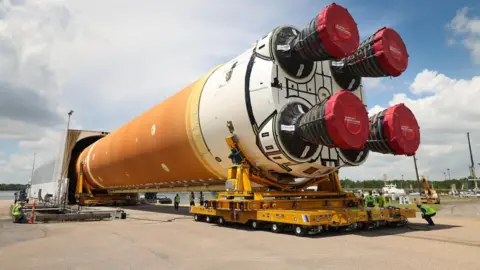Of greater concern, says Dr Barber, is the potential loss of 40 missions to explore other planets and to monitor the impact of climate change on Earth from space, many of which involve collaborations with international partners.
“I think it is very sad that what has taken so long to build can be knocked down with a wrecking ball so quickly with no plan to rebuild it afterwards.”
The projects facing the axe include dozens of planetary missions already in space for which most of the development and launch costs have already been paid for, with relatively small savings proposed on their operating costs.
 Getty Images
Getty ImagesAlso under threat are two collaborations with the European Space Agency: an ambitious plan to bring martian rocks collected by Nasa’s Perseverance rover back to Earth and a mission to send Europe’s Rosalind Franklin rover to the red planet to search for signs of past life.
Prof Sir Martin Sweeting, head of the UK space firm Surrey Satellite Technology Ltd and co-author of a Royal Society report on the future of space, says that while the development was “unwelcome”, there may be an upside for Europe as it takes greater responsibility for its own space exploration programme.
“Maybe we have been too reliant on Nasa [as] the big player to carry a lot of the emphasis in space,” he told BBC News.
“It is an opportunity to think about how Europe wants to get a better balance in its space activities.”
But there is much more downside for Europe in the short term. As well as the return of Mars samples and its rover, the ESA risks reduced access to the International Space Station if it is wound down, and the budget cuts cancel Nasa’s extensive contributions to its successor, the Lunar Gateway, a multinational space station planned for orbit around the Moon.
 NASA
NASAIn its recently published strategy the ESA stated it “will be seeking to build a more autonomous space capability, and to continue being a reliable, strong and desirable partner with space agencies from around the globe”, with the implication that it would do so with or without Nasa.
Also facing cuts are numerous current and proposed Earth Observation programmes, according to Dr Baker.
“These Earth Observation programmes are our canary in the coal mine,” he told BBC News.
“Our ability to predict the impact of climate change and mitigate against it could be drastically reduced. If we turn off this early warning system it is a frightening prospect.”
The budget proposals have yet to be approved by Congress. The Planetary Society’s Casey Dreier has told BBC News that many Republicans have told lobbyists privately that they are prepared to vote against the cuts.
But, Mr Dreier worries that there is a strong possibility that political gridlock might mean that no budget is agreed.
It is likely that the reduced White House budget would be put in place as an interim measure, which then could not easily be reversed, because once space missions are turned off it is hard, if not impossible, to start them up again.